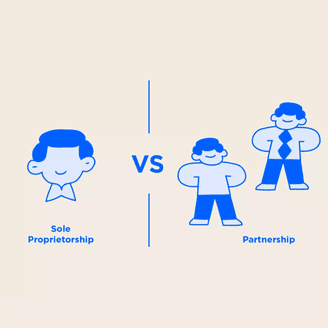- Osome Blog HK
- Sole Proprietorship vs Partnership: Which Structure Is Right for You?
Sole Proprietorship vs Partnership: Which Structure Is Right for You?
- Modified: 14 January 2025
- 6 min read
- Incorporation, Better Business


Gabi Bellairs-Lombard
Author
Gabi creates content that inspires. She's spent her career writing compelling website copy, and now she specialises in product marketing copy. As the voice of our products and features, Gabi makes complex business finance and accounting topics easy to understand. Her top priority is ensuring that her words impact and inspire her readers.
Choosing a business structure in Hong Kong? Sole proprietorship offers control and simplicity, while partnership brings collaboration and shared resources. Make an informed decision that aligns with your goals.
A partnership allows stakeholder collaboration, leveraging varied expertise, while a sole proprietorship provides singular control over business operations.
As an entrepreneur in Hong Kong, choosing the right business structure is one of the crucial decisions you'll face when starting a business. Among the various options available, sole proprietorship and partnership are two common choices. Each has its advantages and disadvantages that cater to different business goals and preferences. In this article, we'll delve into the details of these structures to help you make an informed decision.
Understanding Sole Proprietorship
Let's start by attempting to get to grips with Sole Proprietorships, including their relevance to company registration in Hong Kong. By definition, a sole proprietorship is a business structure where the owner is the business. Straightforward, isn't it? It's a business that is owned and operated by a single individual. This person bears full responsibility for all the losses and debt but also indulges all the profit taken home.
Being simple and straightforward to set up, this is the most common type of business, especially for freelancers and other small business models, making it a popular choice for company registration in Hong Kong. It offers complete control and flexibility to the owner. However, mixing business with personal responsibilities also means, say, if the business gets into debt, your personal assets could be at risk.
Aspect | Details |
|---|---|
| Definition | A simple business structure where the owner and business are the same entity, with full responsibility for profits and debts. |
| Key Features | Owned and operated by one individual, offering simplicity and full control over decisions. |
| Pros | Easy to set up, minimal costs, full control, and straightforward taxation as personal income. |
| Cons | Limited funding, unlimited liability risking personal assets, and restricted access to diverse expertise. |
| Relevance to Hong Kong | Popular among freelancers and small businesses for its simplicity in company registration. |
Now, let's delve deeper into the world of sole proprietorships.
What is a sole proprietorship?
A sole proprietorship is the simplest form of business structure, where an individual operates independently. The business and the owner are legally considered the same entity in this setup. This means the owner has full control over decision-making and operations, making it an attractive option for small-scale businesses and startups.
Pros of a sole proprietorship
- Ease of setup: Establishing a sole proprietorship involves minimal legal formalities and costs, making it an accessible choice for budding entrepreneurs.
- Full control: As the sole owner, you can make decisions without needing consultations or approvals from others.
- Direct taxation: Taxation is straightforward, as the business income is considered the owner's personal income and is subject to personal income tax rates.
Cons of a sole proprietorship
- Limited resources: Sole proprietors often face challenges raising capital, as they depend solely on personal savings or loans.
- Unlimited liability:The owner is personally liable for all business debts and legal obligations, potentially putting personal assets at risk.
- Limited expertise: Running a business alone can limit access to a diverse skill set and expertise, which might hinder growth opportunities.
If you're a freelancer or running a small business in Hong Kong, a sole proprietorship is an easy and affordable way to get started. However, keep in mind that your personal assets could be at risk if the business incurs debts. Always weigh the simplicity and control against the potential liabilities before deciding.
What Is a Partnership?
A partnership is a business structure where two or more people share ownership. Each partner contributes to all aspects of the business, including money, property, labour or skill. In return, each partner shares in the profits and losses of the business.
Business partnerships can be of two types, General and Limited. The former implies all partners are liable for the actions and debts of the business equally, while the latter limits the liability to the extent of the partners' contribution. And, just like a sole proprietorship, setting up a partnership is relatively uncomplicated and cost-effective.
Partnerships have a long history and have been a popular business organisation for centuries. They have played a crucial role in developing commerce and trade, allowing individuals to pool their resources and expertise to pursue common goals. In fact, partnerships were prevalent even in ancient times, with merchants and traders forming partnerships to conduct business across different regions.
Aspect | Details |
|---|---|
| Definition | A business structure where two or more individuals share ownership, contributing resources and sharing profits, losses, and responsibilities. |
| Key Features | Partnerships involve collaboration, resource pooling, and shared financial and operational responsibilities. Types include General, Limited, and LLP. |
| Pros | Partnerships combine expertise, share financial burdens, and offer access to broader networks of clients and suppliers. |
| Cons | Potential disadvantages include conflicts among partners, divided profits, and unlimited liability for general partners. |
| Relevance to Hong Kong | A cost-effective and straightforward option for entrepreneurs looking to leverage shared resources and expertise in a collaborative business structure. |
Types of partnerships
- General Partnership: All partners share equal responsibility and liability in the business's operations and financial obligations.
- Limited Partnership: This type includes general partners who manage the business and limited partners who invest capital but have limited involvement in management.
- Limited Liability Partnership (LLP): Partners have limited liability for the actions of other partners and the business, balancing general partnerships and corporations.
Advantages of a partnership
- Combined expertise: Partners bring different skills and expertise to the table, enhancing the business's capabilities.
- Shared financial burden: Capital investment and financial responsibilities are distributed among partners, reducing individual financial risk.
- Broader network: Partnerships can provide access to a wider network of contacts, potential clients, and suppliers.
Disadvantages of a partnership
- Disagreements: Differences in opinions and decision-making can lead to conflicts among partners.
- Shared profits: Profits are divided among partners, which might lead to disagreements if expectations are not aligned.
- Liability: General partners in a traditional partnership have unlimited liability for the business's financial debts and obligations.
Thinking of starting a partnership in Hong Kong? Consider the type that suits your needs – General, Limited, or LLP. While partnerships offer shared expertise and resources, be aware of potential disagreements and liability risks. A clear agreement is key to avoiding conflicts.
Comparing Sole Proprietorship and Partnership
As we have discussed, a sole proprietorship grants you complete control. There's no split decision-making, shared profits, or conflict of visions. It's simpler to set up and run. The downside? All personal assets are at risk, fewer growth opportunities, and raising capital could be challenging.
Conversely, partnerships provide shared financial commitment, a greater borrowing capacity, and combined skills and knowledge. It's a great way to foster business growth, but it's worth considering that disagreements amongst partners could arise down the line.
Each structure has merits and drawbacks; the choice ultimately boils down to your vision, financing, and other particular preferences.
Aspect | Sole Proprietorship | Partnership |
|---|---|---|
| Control | Full control with no shared decision-making. | Joint decision-making shared among partners, which can foster collaboration but may lead to disagreements. |
| Liability | Unlimited personal liability for all business debts, risking personal assets. | Liability is shared among partners based on the agreement; limited partners or LLP members have limited liability. |
| Taxation | Business income is treated as personal income and taxed accordingly. | Income is distributed among partners and taxed as personal income for each partner. |
| Resources and Growth | Limited to the sole proprietor’s resources, skills, and borrowing capacity. | Shared financial resources and combined skills provide greater borrowing capacity and potential for growth. |
| Ease of Setup | Simple and cost-effective to establish and operate. | Straightforward to set up, but requires a partnership agreement. |
| Best Suited For | Individuals seeking full control and simplicity in operations. | Those looking to pool resources, expertise, and financial commitment to foster business growth. |
Weigh your priorities when deciding between a sole proprietorship and a partnership. For autonomy and simplicity, go solo. For shared financial resources and expertise, consider a partnership. Don’t forget to evaluate liability risks and taxation before making a decision!
Making Your Decision
To determine the right structure, assess your business goals, financial situation, risk tolerance, and the skills you and potential partners bring to the table.
Which business structure aligns with your goals?
Selecting the appropriate business structure is a pivotal decision that should align closely with your entrepreneurial goals and long-term vision. To make an informed choice between a sole proprietorship and a partnership, consider the following aspects:
Sole Proprietorship:
- Solo decision-making: If you value autonomy and want complete control over business decisions without consulting others, a sole proprietorship might suit you. You can swiftly implement your ideas without the need for consensus.
- Simplicity and cost-effectiveness: If you're launching a small-scale venture and seek a straightforward setup with minimal paperwork and expenses, a sole proprietorship provides the simplicity you need.
- Personal connection: If your business heavily relies on your personal brand, skills, or expertise, a sole proprietorship allows you to leverage these factors to their fullest extent.
Partnership:
- Shared responsibility: If you believe in the power of collaboration and wish to combine your strengths with those of others, a partnership can offer a platform for diversified skills and resources.
- Risk mitigation: If you're concerned about the financial risks associated with business operations, a partnership can help distribute the burden among partners, potentially minimising personal financial exposure.
- Network expansion: If you're keen on expanding your business network, partnering with others can provide access to their connections, potentially opening doors to new opportunities.
- Balanced workload: If your business demands a variety of skills or is entering a market where you lack expertise, a partnership allows you to pool knowledge and ensure a more well-rounded approach.
Steps to establish your chosen structure
- Sole Proprietorship: Register your businesswith the relevant government authorities, acquire necessary licenses, and obtain a business registration certificate.
- Partnership: Draft a partnership agreement detailing each partner's roles, responsibilities, profit-sharing, decision-making, and dispute-resolution methods.
Conclusion
To sum it all up, the right choice between a sole proprietorship and a partnership hinges on the specific needs and goals of your business. A sole proprietorship gives you total control and liability; a partnership spreads out the responsibility and financial risk, but you'll have to manage relationships with your co-owners.
While this decision is crucial, always remember there's no definitive right or wrong. You can alter your business structure as it grows and needs change. Whatever you decide, your entrepreneurial courage will ultimately determine your business's success.
Good luck making your decision, and here's to your future business endeavours!






